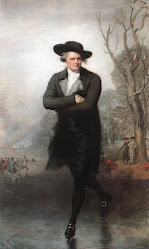
One of my favorite Stuart portraits of Washington, called the Gibbs-Channing-Avery portrait (refers to the past owners). Now residing at the Metropolitan Museum of Art. Painted 1795.
Stuart went to Philadelphia in 1794, expressly to paint George Washington's portrait; which he did, numerous times--- three from life, and many replicas (he painted at least one hundred versions). I doubt that he was thinking much about posterity, perhaps more about a lucrative means of settling his debts. These portraits brought him much visibility and fame. By the time Meeker had his portrait done in 1803, the President had been gone for four years, allowing this phase to slow and enabling the artist to turn to 'lesser lights'. The portraits done in these years, in Philadelphia, round-about the turn of the century, are generally acknowledged to be among his best....In the words of William Dunlap: "He left us the features of those who have achieved immortality for themselves, and made known others who would but for his art have slept in their merited obscurity." Dunlap 1834, vol 1, p.196








